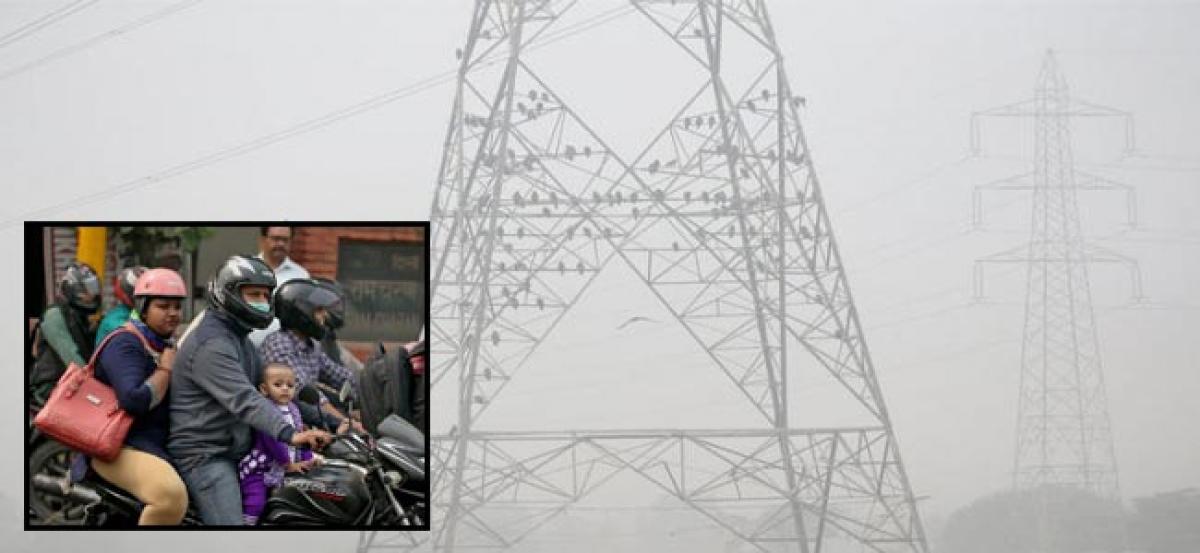Live
- UpStudy: The Smart Solution for Homework Hassles
- Actress Rithika and models inaugurate Sutraa Lifestyle Exhibition
- Loud campaign
- Faculty students celebrated english literature day in Government Degree College
- Huge fire accident.. Shops of street vendors burnt in the fire
- Pawan Kalyan promises to protect the coastal area from sea erosion
- EC Transfers Two Senior IPS Officers in AP ahead of Elections
- DMK analysis predicts victory for INDIA bloc in TN but concedes gains for BJP and NDA too
- India showcasing innovative technologies at World Energy Congress
- IPL 2024: Mitchell comes in for Ravindra as Lucknow opt to bowl first against Chennai
Just In

A million school children were forced to stay at home, some businesses urged employees not to come to work and long queues formed outside shops selling face masks on Monday as New Delhi struggled with its worst pollution for nearly 20 years.
NEW DELHI: A million school children were forced to stay at home, some businesses urged employees not to come to work and long queues formed outside shops selling face masks on Monday as New Delhi struggled with its worst pollution for nearly 20 years.
The Indian capital's government was considering whether to bring back a car rationing scheme, a minister said on Monday, as air pollution remained many times above what are considered to be safe levels for a second week.
New Delhi's streets were shrouded in a heavy gray haze of smoke, ash and other pollutants, and residents complained of breathlessness, watering of eyes, aggravated coughs and wheezing.
"We are now calling this a pollution epidemic. Our advisory to people is to stay at home, if possible work from home," said K.K. Aggarwal, president of the Indian Medical Association.
Levels of PM 2.5, tiny particulate matter that reaches deep into the lungs, remained above 700 in the city's worst affected areas on Monday.
That is nearly 30 times a mean guideline of 25 micrograms per cubic meter on average over a 24-hour period set by the World Health Organization (WHO), which says outdoor air pollution killed 3.7 million people globally in 2012.
"Its a war zone we are talking about, hospitals wards are full of infants," Vimlendu Jha, an environmental activist, said.
A combination of smoke from burning farm residue in surrounding states, fireworks for the Hindu festival of Diwali, dust from construction work and vehicle emissions have pushed pollution levels to their highest in 17 years.
Mohammad Kamil, manager of a store that sells face masks, said he used to sell about six masks on average in a week, but now they had 150 to 200 customers a day.
"We have run out of stock, but we are taking orders. We will provide it to everyone," he said.
The demand for air purifiers also jumped, both from locals and foreigners working in India.
"ODD-EVEN" SCHEME MAY RETURN
Delhi Health Minister Satyendra Kumar Jain said the administration was preparing to restrict the use of private vehicles through the "odd-even" scheme that was introduced temporarily last winter to combat pollution.
Under the system, cars were allowed on the road only on alternate days, according to whether their number plates were odd or even.
"There is a review meeting later this week. We are considering to bring back the odd-even scheme, it is one of many measures," he told reporters.
Delegates attending a global conference on controlling tobacco consumption said they were taken by surprise by the level of pollution.
"I was shocked, did not expect this. It's kind of funny that we are at a conference that aims to have cleaner air and are at a venue that does not have that," said Irene Ryes, a delegate from the Philippines.
U.S. embassy spokesman Joseph Kruzich told the Economic Times that the embassy had employed measures, including supplementary air filtration and construction of vestibules, to provide clean air in workspaces.
At Connaught Place, a central Delhi landmark, the national flag atop a 63-meter pole was barely visible on Sunday.
A normally bustling fitness studio was almost empty, and when a client used an instrument to show staff that indoor air quality was also hazardous, they said they could do little about it with outdoor pollution so high.
British Prime Minister Theresa May was visiting India while toxic smog hung over the capital of 20 million people.
Television pictures showed her walking with Indian counterpart Narendra Modi in the gardens of Hyderabad House in the capital before going in for delegation level talks.
A reception for May at High Commissioner Dominic Asquith's residence, which is located in the heart of Lutyens' Delhi and has an expansive garden, will go ahead on Monday evening as planned, an official said.
"Officially, we are saying nothing at all about pollution," a British diplomat said.
Delhi authorities have blamed the governments of nearby states of Haryana and Punjab for compounding the city's problems by allowing farmers to burn paddy stubble ahead of the wheat sowing season, even though the practice is banned.
Modi's government urged people not to use the pollution problem for political gain.
"If we engage in any blame game, the issue won't get resolved. The problem right now is Delhi's 20 million people are finding it difficult to breathe," said Anil Madhav Dave, federal environment minister.

© 2024 Hyderabad Media House Limited/The Hans India. All rights reserved. Powered by hocalwire.com







